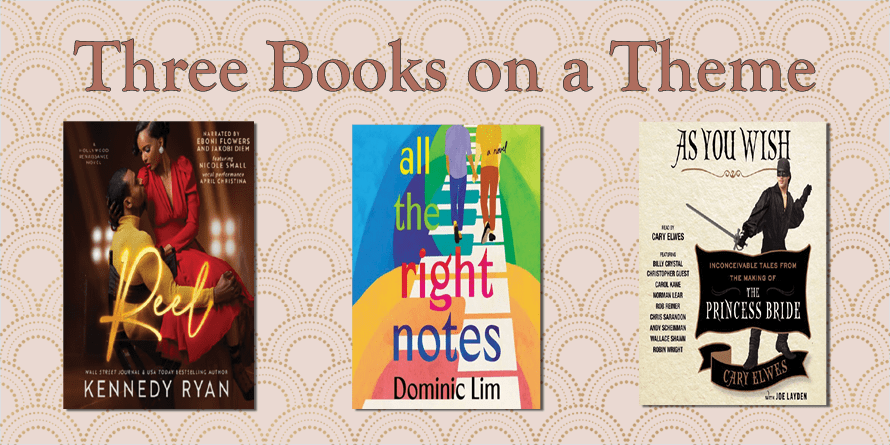
There are a lot of books that some might say they had a better experience while reading the audiobook. It could be a fantastic narrator or group of narrators (full cast narration is always good!). It could be the lyrical prose being heard aloud, so that every bit of text is clear and understandable. It could be that the reader is unable to read text, due to a disability. Or it could just be that a reader prefers hearing the words than seeing them with their eyes. Either way, there are lots of reasons that an audiobook might be a better way to do things, but it doesn’t veer that far from experiencing the book in text.
These three books, on the other hand, have a few things in their audiobooks that make the audio not just a superior experience, but a whole different one.
I’ll admit it: this book moved a little too slowly for me in print, but once I started listening to the audio, it was like the heavens opened and I was able to enjoy the story that my brain was not allowing me to enjoy reading with my eyes. And then, as I continued to listen, I got to hear a few more things: SONGS! There was singing, and there was a bit of background music in some places. This makes sense in the scheme of things, as the book itself is about a director and an actress working together on a musical period piece. So yes, the narrators are fantastic, but also, there’s music!
CN: discussion of the past death of a family member from terminal illness; on-page chronic illness issues including fainting and multiple hospital stays; discussion of transplants; graphic sexual content; everyday racism; historical racism and homophobia
And that wasn’t the only time I got to experience a bit of music in an audiobook. All The Right Notes is the story of a pianist who is reunited with his first love when his father—their old choir teacher—announces his retirement. We get both the story of their youthful friendship and their reunion, all with a few notes interspersed.
Literally.
Quito, the main character, isn’t just a pianist, but a composer. We get to hear snippets of the songs that mean the most to him throughout the book, and it’s a lovely addition to the story. It’s one thing to turn the page and read the lyrics, but to have them sung to you? Perfection.
CN: discussion of past death of a family member from an accident; hospital visits; off page death of a family member; homophobia; casual racism and xenophobia; graphic sexual content; discussion of dubious consent
Okay, this one is obviously a bit different from the previous ones. Instead of being able to hear the songs you see on the page, you get to hear the voices of several people who are subjects of Cary Elwes’s stories.
Let me back up: if you’re unfamiliar, this is a bit of an oral history of the creation of The Princess Bride through the eyes of a young Cary Elwes, one of the film’s stars, and probably the person who had the biggest success from it. If you’re reading the print book you might get some interjections from the movie’s cast and crew, as well as some photos, but the audiobook has two things going for it: first, is Cary himself. He narrates the book and does some of the most hilarious imitations of people like Rob Reiner, Billy Crystal, and Andre the Giant. The second thing is those aforementioned interjections, often narrated by the people themselves, with a few exceptions. Sure, Billy Crystal sounds a bit like he’s calling in on a pay phone, but the fact is that his voice is there. As is Robin Wright’s, and Rob Reiner’s himself. It’s such a joyful experience, and while the text of the book is great, the audiobook is really the only way to experience it.
CN: discussion of the death of a family member; multiple set injuries; discussion of the death of a cast member; PG violence
TL;DR: Audiobooks are regularly great, but sometimes they’re really the only way to experience a book. Check one out today!

